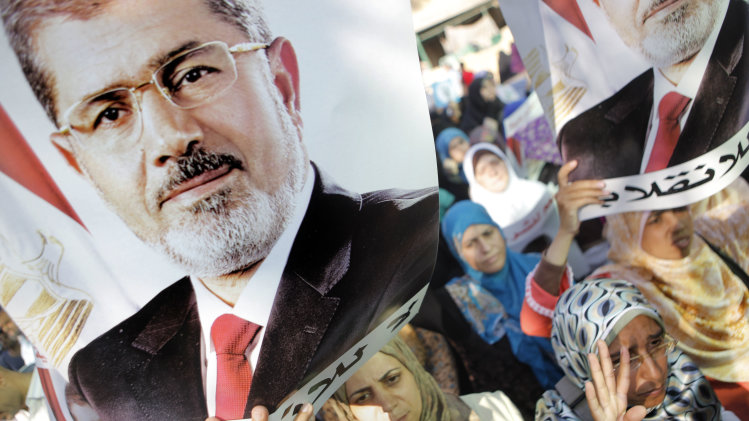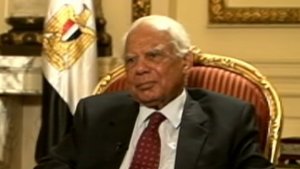Egyptian military crackdown.......
Egyptian military crackdown unravels Muslim Brotherhood
Can the Islamist Muslim Brotherhood, which negotiated decades of repression, survive this summer's upheavals?

The Egyptian military's crackdown on the Muslim Brotherhood, particularly the arrest of top figures in recent days, has left the organization rudderless and facing one of the greatest challenges of its 80-year history.
The hierarchical body that normally excels at communication, discipline, and mobilization is in disarray after the arrests of top leaders and hundreds of mid-level and grassroots members. Many of those not arrested have stopped using their mobile phones and are in hiding to avoid the police since the brutal crackdown Aug. 14 on the Brotherhood-led protests in support of ousted president Mohamed Morsi.
Leaders who normally meet to make decisions together can no longer easily do so, and the breakdown in communication means difficulty getting their directives to the grassroots. Despite an announcement that the group would hold daily protests after a large turnout in the streets on Friday, the Brotherhood-led alliance against the military canceled some of Sunday's protests due to concerns about bloodshed amid low turnout and confusion. It has not staged any large protests in the capital since – a sign that it is currently unable or unwilling to continue its street action against the military.
RECOMMENDED: Has Egypt brought back Mubarak's police state?
The organization is in “a state of unbalance,” says Khalil Al Anani, an expert on the Brotherhood at Durham University in the UK. “Where they should go from here, how to react to the state violence –” these are questions the organization is struggling to address. "It's a very tough time for the Brotherhood, and the consequences of this would be very serious in the future, in terms of [the potential] for the movement to fracture and to what extent the grassroots would remain loyal to the leadership in terms of using violence or reacting violently.”
LEADERLESS
Egypt's state news agency reported this morning that Safwat Hegazy, a well-known conservative preacher who supports the Brotherhood, was arrested near the Siwa Oasis, close to the Libyan border. The website of the state-run Al Ahram newspaper reported that Mr. Hegazy dyed his hair, trimmed his beard, and dressed as a woman, including wearing a niqab, or face veil, in an attempt to avoid arrest.
State television aired photos of the preacher, his gray beard shaved into a goatee that was dyed jet black, between two soldiers. Hegazy spoke at rallies in support of Morsi during his election bid, and appeared onstage at the pro-Morsi protest camp before police dispersed it. He was wanted on charges of inciting violence during an attack by the police and military that killed 54 Islamist protesters July 8.
Mourad Aly, a spokesman for the Brotherhood's Freedom and Justice Party, was also arrested this morning as he attempted to board a flight to Italy. Mohamed Badie, the general guide and spiritual leader of the organization, was arrested in the early hours of Tuesday in an apartment near the Rabaa Al Adawiya mosque, the focal point of the protest camp. He is charged with inciting murder in relation to the June 30 attack on the Muslim Brotherhood's headquarters.
Mr. Badie, whose son was killed in violence between protesters and police on Friday, joins his deputy and chief Brotherhood strategist Khairat El Shater in prison.
“The people who would normally be making the most important decisions on setting the strategic course for the organization are in prison – Shater and Mohamed Badie, who were the two most influential figures in the movement,” says Shadi Hamid, director of research at the Brookings Doha Center. “It presents an opportunity for the mid level and the second tier of the Brotherhood to play a more assertive role, and we'll have to wait and see to what extent those types of figures emerge, and what kind of role they play in the organization.”
ON THE RUN
The Brotherhood, long focused on charity and bottom-up social change before it entered politics, endured decades of state oppression, but authorities have not arrested the general guide in decades. The top leadership was arrested in the 1950s under former President Gamal Abdel Nasser, whose heavy-handed crackdown on the group continued to a lesser degree under the following presidents. Under Hosni Mubarak, who was ousted in January 2011, the group was outlawed and leaders often arrested, but the group was allowed to run its members in elections as independents.
The current wave of repression began with the military's ouster of Morsi following mass protests against his rule across the country. Within hours of Morsi's detention – he has since been held in a secret location – security forces arrested several top Brotherhood leaders.
Morsi supporters held protests against the coup and built two protest camps in Cairo where they vowed to stay until the former president was reinstated. On Aug. 14, security forces attacked the camps, using bulldozers, tear gas, and live ammunition. State television showed footage of armed protesters firing at security forces from inside the camps. According to Human Rights Watch, at least 377 people died during the dispersal of the Rabaa al Adawiya protest camp alone. The group later declared the event the "most serious incident of mass unlawful killings in Egyptian history."
Since then, many Brotherhood members have been on the run, not returning to their homes at night and switching off their phones for fear of arrest. Many who had been active on Facebook and Twitter are no longer posting. Spokesman Gehad el Haddad said many mid-level leaders were killed in the dispersal of the sit-in, including 12 he knew personally.
A mid-level member who asked not to be identified said he and his father, a top leader in the organization, were both staying away from their homes and changing phone numbers to try to evade arrest. “No one is advised to stay at home,” he says. “We were thinking before that arrest might be easier than shooting us, but arrest means killing us.” On Sunday, 36 Islamist prisoners were killed while in police custody. Brotherhood members say they're hearing reports of abuse from those who are detained.
The mid-level member said seven or eight of his friends have been arrested. He acknowledges that communication within the organization is suffering.
“It is kind of hard for the time being. But I know that the Muslim Brotherhood are a very organized organization, and they have the hierarchy. If one part of the organization is missing, the other body will work normally,” he says, displaying confidence that the organization will soon return to effective functioning. “It is in process. It's not as effective as it was. But I know that people are trying.”
The protests since Morsi's ouster have been led by an alliance of Islamist groups headed by the Brotherhood. Before the brutal dispersal of the protest camps, the group would meet every day to make decisions. Mid-level leaders of that alliance said this week they are having a difficult time reaching their leaders.
Mohamed Okda, an alliance spokesman, said the group held a meeting Sunday, but he only found out about it just before it was to begin. “Communication within the coalition is very difficult right now,” he said after the meeting. “No one is talking on the phone. For me to know about this meeting, it was through maybe three intermediaries who managed to get to me and tell me we were meeting today.”
NO 'GAME PLAN'
Anani says the Brotherhood currently has no “central decisionmaking process” and is not in full control of its rank and file. “That's why you can find some confusion in its behavior, whether to run protests or not,” he says. “I think the ability of the Brotherhood to mobilize people is decreasing by time.”
There have been some protests outside of Cairo since Sunday, but nothing like the massive mobilization the organization is known for. The Brotherhood member says this is because of the high death toll that resulted from Friday protests, when at least 173 people were killed in clashes with police and other civilians. “At this moment, people are waiting for them to call to people to go out. But [leaders] are weighing the risk of the blood,” he says.
In an op-ed in the Guardian published today, Brotherhood leader Mohamed Al Beltagy, who is wanted by authorities but has not been arrested, said the Brotherhood would remain committed to nonviolence and would continue to confront the authorities.
"For the sake of Egypt, we will continue to take to the streets across the country peacefully to declare this coup null and void," he wrote.
Hamid says the Brotherhood doesn't have a “game plan.” There is little they can do, up against a military with broad public support that “has made the decision they want to destroy and dismantle the organization,” he says. Egypt's prime minister has proposed legally disbanding the group, as government officials and media speak of waging a war on terrorism.
“The question is to what extent they can sustain protests, keep morale in their ranks, and also coordinate effectively with other actors in the coalition, and see if they can expand beyond the coalition ranks and bring non-Islamists into the fold. That will be a key determinant of whether they can build something and gain more support,” says Hamid. “I think so far they haven't been able to do that.”
Egyptian-American Mohamed Soltan, a member of the alliance organized in support of Morsi, but not a Brotherhood member, acknowledged that “right now we're out of touch with our leadership. We're regrouping.”
But people have not given up on confronting the military, he said, adding that "this has gone far beyond the Brotherhood now."
“You're talking about every household in Egypt now either knows someone who has died or been injured or has been affected by them personally. So if you think that protests are going to stop, there's no way anytime soon, that's for sure. There's no way people are going to let their kids' blood go in vain. yahoo news







Comments